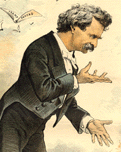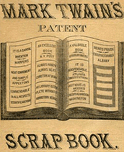|
The fifteenth regular toast was "The Babies. -- As they comfort us in our sorrows, let us not forget them in our festivities." I LIKE that. We have not all had the good fortune to be ladies. We have not all been generals, or poets, or statesmen; but when the toast works down to the babies, we stand on common ground. It is a shame that for a thousand years the world's banquets have utterly ignored the baby, as if he didn't amount to anything. If you will stop and think a minute -- if you will go back fifty or one hundred years to your early married life and recontemplate your first baby -- you will remember that he amounted to a good deal, and even something over. You soldiers all know that when that little fellow arrived at family headquarters you had to hand in your resignation. He took entire command. You became his lackey, his mere body-servant, and you had to stand around too. He was not a commander who made allowances for time, distance, weather, or anything else. You had to execute his order whether it was possible or not. And there was only one form of marching in his manual of tactics, and that was the double-quick. He treated you with every sort of insolence and disrespect, and the bravest of you didn't dare to say a word. You could face the death-storm at Donelson and Vicksburg, and give back blow for blow; but when he clawed your whiskers, and pulled your hair, and twisted your nose, you had to take it. When the thunders of war were sounding in your ears you set your faces toward the batteries, and advanced with steady tread; but when he turned on the terrors of his war-whoop, you advanced in the other direction, and mighty glad of the chance, too. When he called for soothing syrup, did you venture to throw out any side-remarks about certain services being unbecoming an officer and a gentleman? No. You got up and got it. When he ordered his pap bottle and it was not warm, did you talk back? Not you. You went to work and warmed it. You even descended so far in your menial office as to take a suck at that warm, insipid stuff yourself, to see if it was right -- three parts water to one of milk, a touch of sugar to modify the colic, and a drop of peppermint to kill those immortal hiccoughs. I can taste that stuff yet. And how many things you learned as you went along! Sentimental young folks still take stock in that beautiful saying that when a baby smiles in his sleep, it is because the angels are whispering to him. Very pretty, but too thin -- simply wind on the stomach, my friends. If the baby proposed to take a walk at his usual hour, two o'clock in the morning, didn't you rise up promptly and remark, with a mental addition which would not improve a Sunday-school book much, that that was the very thing you were about to propose yourself? Oh! you were under good discipline, and as you went fluttering up and down the room in your undress uniform, you not only prattled undignified baby talk, but even tuned up your martial voices and tried to sing! -- Rock-a-by Baby in the Tree-top, for instance. What a spectacle for an Army of the Tennessee! And what an affliction for the neighbors, too; for it is not everybody within a mile around that likes military music at three in the morning. And when you had been keeping this sort of thing up two or three hours, and your little velvet-head intimated that nothing suited him like exercise and noise, what did you do? You simply went on until you dropped in the last ditch. The idea that a baby doesn't amount to anything! Why, one baby is just a house and a front yard by itself. One baby can furnish more business than you and your whole Interior Department can attend to. He is enterprising, irrepressible, brimful of lawless activities. Do what you please, you can't make him stay on the reservation. Sufficient unto the day is one baby. As long as you are in your right mind, don't you ever pray for twins. Twins amount to a permanent riot. And there ain't any real difference between triplets and an insurrection. Yes, it was high time for a toast-master to recognize the importance of the babies. Think what is in store for the present crop! Fifty years from now we shall all be dead, I trust, and then this flag, if it still survive (and let us hope it may), will be floating over a Republic numbering 200,000,000 souls, according to the settled laws of our increase. Our present schooner of State will have grown into a political leviathan -- a Great Eastern. The cradled babies of today will be on deck. Let them be well trained, for we are going to leave a big contract on their hands. Among the three or four millions cradles now rocking in the land are some which this nation would preserve for ages as sacred things, if we could know which ones they are. In one of those cradles the unconscious Farragut of the future is at this moment teething -- think of it! -- and putting in a world of dead earnest, unarticulated, but perfectly justifiable profanity over it, too. In another the future renowned astronomer is blinking at the shining Milky Way with but a languid interest -- poor little chap! -- and wondering what has become of that other one they call the wet-nurse. In another the future great historian is lying -- and doubtless will continue to lie until his earthly mission is ended. In another the future President is busying himself with no profounder problem of state than what the mischief has become of his hair so early; and in a mighty array of other cradles there are now some 60,000 future office-seekers, getting ready to furnish him with occasion to grapple with that same old problem a second time. And in still one more cradle, somewhere under the flag, the future illustrious commander-in-chief of the American armies is so little burdened with his approaching grandeurs and responsibilities as to be giving his whole strategic mind at this moment to trying to find out some way to get his big toe into his mouth -- an achievement which, meaning no disrespect, the illustrious guest of this evening turned his entire attention to some fifty-six years ago; and if the child is but a prophecy of the man, there are mighty few who will doubt they he succeeded. |


